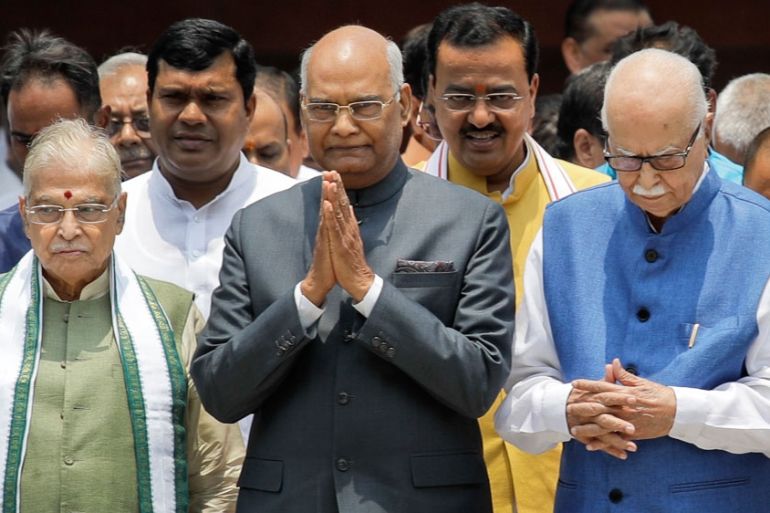India’s President Ram Nath Kovind takes oath
Kovind said he will use his position to improve the situation of Dalits, a community once known as ‘untouchables’.

Ram Nath Kovind has been sworn in as president of India, becoming only the second leader from the oppressed Dalit community to be elected head of state.
A former lawyer and state governor, Kovind was elected to the largely ceremonial position last week with more than 65 percent of the vote by members of India’s parliament and state assemblies.
Kovind, accompanied by his wife, paid respects early on Tuesday at a memorial dedicated to India’s independence hero Mahatma Gandhi in New Delhi.
The 71-year-old was nominated by the ruling right-wing Bharatiya Janata Party (BJP) in a move analysts say would help Prime Minister Narendra Modi tighten his grip on power and gain political capital ahead of his re-election bid in 2019.
READ MORE: India’s Dalit cattle skinners share stories of abuse
“I grew up in a mud house, in a small village. My journey has been a long one, and yet this journey is hardly mine alone. It is so telling of our nation and our society also,” Kovind said after taking the oath of office in parliament.
“For all its problems, it [nation] follows that basic mantra given to us in the preamble of the constitution – of ensuring justice, liberty, equality and fraternity, and I will always continue to follow this basic mantra.”
Kovind said he will use his position to improve the situation of Dalits, a marginalised 200-million strong community once known as “untouchables” and ranked among India’s poorest.
Dalits remain the most vulnerable and marginalised segment of Indian society.
READ MORE: Born a cremator – An Indian boy’s fight for an education
Kancha Ilaiah, one of India’s leading Dalit intellectual, told Al Jazeera that Kovind has been elevated to the post in the context of passive protests and rebellions by Dalits at the ground level.
“In universities and in rural areas, Dalits were feeling very unhappy with the existing government,” he said. “The question of cow protection laws and lynching was really terrifying them since by and large Dalits are beef eaters and they skin the dead cattle for which they have been attacked.”
“The question that we will have to see how far President Kovind will see to it that their interests, food culture and dignity is protected,” Ilaiah said.
India’s prime minister wields executive power, but the president can send back some parliamentary bills for reconsideration and also plays a guiding role in the process of forming governments.
Kovind is the second Dalit president after KR Narayan, who held the post for five years from 1997.
But Kovind’s win makes him the first president aligned to the Rashtriya Swayamsevak Sangh, a Hindu revivalist volunteer group which is the ideological fountainhead of the BJP.
|
|